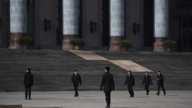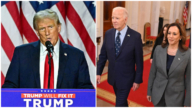【新唐人2013年11月14日訊】中共三中全會召開前傳的沸沸揚揚的「383改革方案」,在三中全會的會議公告中縮水。會議公報宣稱,中共中央將成立「全面深化改革領導小組」,暗示著「383改革方案」並沒有達成一致。大陸專家學者指出,中共不放棄一黨專政的政治體制,一切改革都是空談。
中共三中全會結束,立即宣佈將建立一個委員會來「深化改革」,但是沒有表明,這些改革甚麼時候通過。國外媒體報導說,這暗示共產黨領導人,僅僅對泛泛的主題表示同意,但是對於細節,諸如國有企業的地位等問題,則展開廝殺。
在三中全會召開之前,國務院發展研究中心公布了一份「383改革方案」,提出必須推動行政管理體制、壟斷行業、土地制度、金融體系、財稅體制、國有資產管理體制、創新體制,以及對外開放等,八個重點領域的改革。
專家認為,三中全會僅僅呼籲泛泛的金融和財政改革。
在農村改革問題上,公報沒有直接贊同給予農民對他們耕種土地的所有權,和出售土地的權利。只是呼籲給予他們更大的財產權,以及公平獲得公共服務的權利。
對於中國國有企業,公報聲稱,國有企業和私營公司都是「國家經濟和社會發展的基礎」。同時,公報說,改革必須「體現公有制經濟的領導作用」,暗示﹕中國龐大的國有企業將繼續扮演突出角色。
原中共國務院辦公廳秘書俞梅蓀認為,公報沒有完全體現「383改革方案」,顯示經過三中全會當中的博弈和討論,方案有所收縮。
另外,在三中全會會議期間,《中國日報》引述國資委企業改革局局長白英姿的話報導說,私人投資者可購買國企10%-15%的股份。但是隨後國資委在官方微博中「闢謠」指稱﹕報導失實。官方前後矛盾的表態,令人懷疑中共高層發生分歧。
就像外界廣泛預期的那樣,公報沒有提及政治體制改革。
前中共國務院辦公廳秘書 俞梅蓀:「3.46實際上政治體制不改革,一黨專制,官場腐敗,權錢交易,權貴經濟和權貴法治,這個不變化的話,所有的改革都是要面臨利益集團強烈的抗拒的。所以都是很難實現的。」
據說司法權要從地方獨立出來直屬中央。俞梅蓀說,司法本來就很腐敗,如果獨立出來,腐敗可能更加猖獗。
俞梅蓀前年12月到哈爾濱呼蘭區開發區,向村民普及他當年參與制定的《全國人大村民委員會自治法》,倡導農民自己選舉。
俞梅蓀:「問題是投票的結果,投票最高的沒有當選,一個類似黑社會這類的人,他通過地方黨政支持,他反而當上村民委員會主任。農民跟我提出:如果這個村民委員會主任不是民選的,是上面安排的,他照樣可以買賣土地,照樣可以掠奪農民的土地,照樣可以強拆。所以任何一個改革一碰就是個政治體制改革的問題。」
北京註冊會計師杜延林認為,中國經濟生活的不平等,不在於國有企業佔據優勢地位,而在於整個國家的現實是,所有資源都是跟權力相結合的,因此這不是一個國企改革的問題,而是一個政治體制改革的問題。
北京註冊會計師杜延林:「所有的資源都控制在權力手裡。那麼怎麼解決這個問題?其實不是一個國有體制改革能夠解決的,肯定是跟政治體制改革有關的。就是增加社會監督,增加一個真正的外部監督的問題。如果不能解決這個問題,市場經濟跟權力的脫鉤是非常困難的。」
美國中文媒體《大紀元時報》評論指出,這次三中全會提到的改革問題,觸及到政府不同的部委,不同的層級,不同的派系,引發巨大的權力和利益轉移,也就必然導致不同派系之間、中央與地方之間的強烈爭奪以及利益集團的阻擊。
評論說,中共媒體高調炒作涉及司法、國企和土地等敏感議題,是中共在空前亡黨危機下試圖保權、保黨的一次大舉動。然而,縱觀中國政局核心問題與政治、經濟、社會狀況,中共大勢已去,無力回天。
採訪編輯/秦雪 後製/陳建銘
Reform Programs Shrink in China
The shrinking of 383 Reform Plans caused uproar
during the Third Plenary Session
of the Chinese Communist Party (CCP).
The communiqué declared that the CCP will set up
a deep comprehensive leading reform group,
hinting that they did not reach an agreement
on 383 reform plans.
Mainland scholars point out that without giving up
the one-party dictatorship, all reforms are empty talk.
The CCP announced its deep reform right after the Third
Plenary Session, but it did not indicate the exact time.
Foreign media reports said that this suggests the CCP
leaders only agreed on the subject matter such as
state-owned enterprises and other issues, but not
the details, and then started fighting.
Eight key areas were listed in the 383 Reform Plans:
promotion of an administrative management system,
monopolized industries, land system, financial system,
tax system, state-owned assets management system,
innovation system, and externally opening up
to other countries.
Experts believe that the CCP leaders discussed only
general financial and fiscal reforms in the session.
With rural reform, the communiqué did not directly
endorse giving farmers their arable land
and the right to sell land.
They just called for giving farmers more rights
and equitable access to public services.
Regarding state-owned enterprises, the communiqué
said that state enterprises and private enterprises
are foundations of national economic
and social developments.
Meanwhile, the communiqué said that the reform must
reflect the leadership role of public economy, meaning
that China’s huge state-owned enterprises will continue
to play a prominent role.
Yu Mei Sun, former secretary of the State Council,
believes that the communiqué did not fully reflect
the 383 Reform Plans, which after the session showed
reform plans shrank.
In addition, China Daily quoted that during the session,
the director of Enterprises Reform Bureau said
that private investors may purchase 10-15%
of state-owned enterprises.
Later officials from the reform bureau claimed
that it was a misunderstanding.
This controversy shows the disagreement
within the leadership.
As widely expected, the communiqué did not mention
political system reform.
Yu Mei Sun: “In reality, without political system reform,
the one-party rule, official corruption, money and power
rule of law will continue, then all reform plans
are facing resistance from strong interest groups.
Thus, it is difficult to carry out any reform.”
It is said that local judicial power should be independent
and directly under the Central government.
Yu Mei Sun believes that the justice system is bad
enough now, if goes under the central government, it will become worse.
In December 2011, Yu went to Hulan District of Harbin
and showed farmers how to get involved
in the development of the NPC village committee
autonomy.
Yu Mei Sun: “The problem is the election.
The one that gets the most votes is not elected,
but an underworld figure, through local party
and government support, can become the director
of the village committee.
Farmers said that if he is not elected by farmers,
he can still sell land, rob farmers of their land
and demolish farmers’ houses.
So, it is a question of political system reform.”
Du Yanlin, Beijing CPA, believes that China’s
economic inequality does not lie in the dominance
of state-owned enterprises, but in all resources
combined with the power.
Thus, it is not a matter of state-owned enterprises,
but of a political system reform.
Du Yanlin: “All resources are in the hands
of the powerful.
How do we solve this problem?
It cannot be resolved by state-owned enterprises reform,
but it can be resolved with political system reform.
It means that we need more public monitoring.
Otherwise, a market economy separated from power
will be very difficult.”
The Epoch Times in the US pointed out that reform
issues during the session touched on various government
ministries, different levels, and different factions,
causing a huge shift of power and interests.
It will inevitably lead to strong fighting between
the central government and local governments,
in addition to interest groups’ opposition.
The report from the Epoch Times said that the CCP
media hype involved high-profile judicial,
state-owned enterprises, land and other issues.
It is an unprecedented move for the CCP
to save the party and its rule.
However, looking at China’s political core issues
and political, economic and social conditions,
the CCP has reached the point of no return.



























